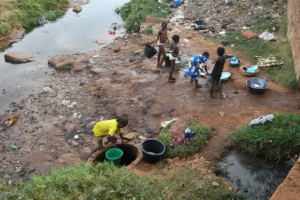10 Facts about Sanitation in Burkina Faso

Over the past decade, Burkina Faso has seen a decrease in poverty from 57.3% in 2003 to 43.7% in 2014. However, sanitation services in the country are still out of reach for many people. Since the 1990s, the government, along with its partners, has been working to improve sanitation in Burkina Faso.
10 Facts about Sanitation in Burkina Faso
- People in Burkina Faso face a lack of access to sanitation. In Burkina Faso, approximately 22% of its 19.77 million people, have access to a toilet. In rural communities, 88% of people are lacking sanitation. In addition, 62.91% of rural people lack access to an adequate supply of safe water which can affect the hygiene of the community.
- Health problems result from a lack of sanitation access. Burkina Faso’s under-five child mortality rate in 2018 was 76.4 for every 1,000 live births. One of the leading causes of death for both children and adults in the country is diarrhea-related illnesses. One of the ways to prevent diarrheal disease is with good hygiene and improved water quality. According to the CDC, 88% of diarrhea-related deaths are due to unsafe water, bad sanitation and lack of good hygiene. In 2017, for every 100,000 individuals, 52 people died in Burkina Faso from unsafe sanitation. In many developed countries, deaths linked to unsafe sanitation is less than 0.01.
- Inadequate sanitation is costing the country. According to the World Bank, the lack of good sanitation costs the country approximately 154 million dollars each year. This is caused by lost productivity and the cost of health care.
- Basic hygiene is lacking in schools. In 2016, 70% of schools in Burkina Faso had access to basic sanitation but only 18% of schools had basic hygiene service. The term “basic hygiene service” refers to schools that give students access to facilities that allow them to wash their hands with soap. For girls, the lack of adequate sanitary protection materials and gender-segregated latrines for privacy can reduce their willingness to go to school.
- There is a lack of sanitation in rural communities in Burkina Faso. The lack of sanitation in rural communities results in a high percentage of open defecation in some areas. Smart Development Networks, a Netherlands-based NGO, is working to change that. The organization partners with local leaders and members of the community to talk about the dangers of open defecation. The organization has reached 50,000 people. In addition, 5,000 latrines have been built by community members.
- Burkina Faso is facing a water crisis. Like many countries in Sub-Saharan Africa, Burkina Faso’s urban population is growing rapidly with an annual growth rate of approximately 5.2%. When it comes to water supply, Burkina Faso is at a disadvantage. It is a landlocked country with limited water resources. To improve the country’s water quality and sanitation, the government of Burkina Faso partnered with the World Bank in implementing an urban water sector project from 2009-2018. Towards the end of 2016, approximately 610,000 people received access to water as a result of this project. In addition, the project gave approximately 440,000 people access to better sanitation. The project also provided more schools with access to better sanitation.
- The ONEA is working to address the water crisis. After facing a water shortage in the 1990s, Burkina Faso created L’Office National de l’Eau et de l’Assainissement (ONEA), a state-owned national utility company. The ONEA provides 54 towns in Burkina Faso with water supply, wastewater and human waste treatment. As Burkina Faso’s urban population grew in cities like the capital Ouagadougou, the company has managed to keep up with the growing demand for its service. In 2003, only 37% of the people who lived in Ouagadougou pumped water that was available to them where they live. Within 7 years that number grew to 48%. The ONEA hopes to increase water coverage to 80% in places where the company works by 2030. The company’s focus is to first increase the number of public taps before moving to provide water to each household.
- To improve sanitation in Burkina Faso, the government partnered with the World Bank. The partnership’s goal is to provide more people in the country with better access to sanitation and water quality. In 2018, the World Bank pumped $300 million into Burkina Faso’s “Water Supply and Sanitation Program for Results.” The project is expected to help 1.1 million people by giving them access to better water supply, as well as improve sanitation for 1.3 million people. In addition, the program will fund trainings, strengthen human capital and encourage partnerships within universities, government agencies, municipalities and research centers to improve the management and service delivery of sanitation services.
- Burkina Faso is receiving aid from Germany. The German Federal Ministry for Economic Cooperation and Development partnered with Burkina Faso’s government to improve the country’s sanitary services. The results are promising. In 2019, this partnership drilled 302 boreholes, repaired 172 boreholes and rehabilitated 10 simplified drinking water supply systems. Furthermore, this project has built 6,095 family latrines and constructed 2,352 domestic cesspools.
- In Burkina Faso, violence has broken out due to militia and jihadist groups. This has forced 800,000 people to flee their homes. According to Oxfam, poor communities have taken in a lot of incoming refugees which has stressed their water and food resources. Currently, 1.9 million people in the country need water. To help with the crisis, Oxfam is working to install water tanks, improve hand pumps and create water supply points. Oxfam is also supplying latrines, showers, washing areas, waste pits and bins.
While Burkina Faso faces problems with access to sanitation, the situation is improving. Organizations, such as the World Bank, as well as other countries are working with Burkina Faso’s government to improve the situation. However, the current conflict in the country may stall some of its plans for improving the quality of sanitation.
– Joshua Meribole
Photo: Flickr
